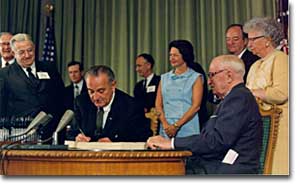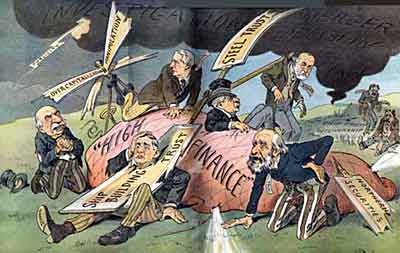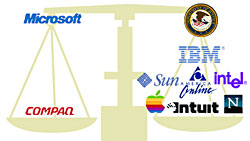11d. Social and Regulatory Policy

Food stamps can mean the difference between getting by and going hungry. But the question of how to distribute them and other forms of welfare support has become a hotly contested issue. How much? For how long? And, most importantly, who is eligible?
Unalienable rights. Life, liberty, and the pursuit of happiness.
Does the right to pursue happiness include access to a free public education? Do all Americans have an unalienable right to health care under this happiness umbrella? Should the unemployed be assisted in their times of need?
Early American leaders did not interpret the "pursuit of happiness" this broadly. But 20th century Americans continually expanded the notion of a pursuit of happiness to include these and an array of other social concerns. Consequently, much of the modern political agenda revolves around determining social policy.
Social Policy
Welfare currently has a bad name in American politics, often conjuring images of irresponsible recipients who take welfare payments from the government instead of working. Conservatives charged that continual government support for the unemployed provided a disincentive to find work and fostered a culture of dependency. Although most liberals opposed ending welfare payments outright, there was bipartisan agreement that reform was needed in the mid-1990s. The greatest myth about welfare is the amount the federal government actually spends on relief checks. Throughout the 1990s, payments of this nature typically comprised about 3 to 4% of the nation's annual budget.

When President Lyndon Johnson enrolled former President Harry Truman as the first beneficiary of the Medicare program in 1965, he created an entitlement program that constitutes a significant chunk of the federal budget.
Actually, the most extensive single welfare program is Social Security — a social insurance plan for the elderly. Employees and employers contribute to a fund through payroll taxes, and virtually everyone who contributes for at least ten years is eligible for payments. Most Americans support the program as long as it's called "Social Security" and not "welfare." Other "entitlement" programs include Medicare, Medicaid, Aid to Families with Dependent Children, and food stamps.

Theodore Roosevelt was a "trust buster" who believed that the government needed to oversee big business to make sure its practices were in line with the public interest. This cartoon from 1904 shows how the storms of government investigation — a power that Roosevelt gave the Bureau of Corporations — have downed the airship of "High Finance" and shaken the trusts into disarray.
One of the most nettlesome political issues of the 1990s was the health care controversy. Throughout the decade, between 30 and 40 million Americans were uninsured for medical fees in any given year. In 1993, Congress defeated President Bill Clinton's proposed plan to provide all citizens with basic insurance coverage for doctor fees, hospitalization, and prescription drugs. Conservatives deemed the plan as too expensive, with unforeseeable intrusion of the government into personal health care decisions. On the other hand, even most conservatives accept government's role in medical research and regulating food and drugs. The Public Health Service, headed by the Surgeon General, researches, gathers information, and monitors health care. The Food and Drug Administration regulates the labeling and processing of most foods, drugs, and cosmetics.

The government actively regulates business, as seen in the recent antitrust suit filed by the Department of Justice against Microsoft. In its case, the government has enlisted a number of Microsoft's competitors to testify about the company's business practices.
Public education is generally regarded as the responsibility of local communities, so the federal government's role in this area is limited. Today the majority of federal funds for education are directed to higher education, primarily in the form of student loans and grants. Since the 1950s, the federal government has provided funds for Grades 1-12, particularly for programs to upgrade science, language, and mathematics. Other programs, such as Head Start for preschoolers, focus on helping underprivileged children. Even so, the federal government today funds less than 10 percent of the total amount spent on education in the United States.

The nation's natural resources are subject to government regulation. The Bureau of Land Management oversees the production and conservation of oil and gas, geothermal energy and helium (which is extracted from natural gas).
Regulatory Policy
While most Americans are proud of living "in the land of the free," in reality their lives are regulated by the government in many inconspicuous ways. Consider the American who starts her day with a little breakfast. Her food is regulated for purity and freshness, and appliances such as her coffeepot, her microwave, and her toaster must meet federal safety requirements. Her car, her children's school, and her place of work must all meet federal standards, and state and local governments may impose additional regulations. Her whole schedule revolves around time, which is regulated by the government. Eastern, Central, Mountain, and Pacific Standard Times are determined by the federal government.
Federal regulations fall into three basic categories:
- Regulating business. The national government began regulating business in the late 1800s in order to eliminate monopolies, businesses or groups that have exclusive control of an industry. Government now regulates a wide array of business practices, including the elimination of competition and fraudulent product offerings.
- Regulating labor. Most labor policies have come about to protect the American worker. The government has promoted equal employment opportunities, safe and sanitary workplace standards, and fair bargaining practices between employer and workers.
- Regulating the environment and energy. Environmental policy is the responsibility of many different government departments and agencies. Especially important is the Environmental Protection Agency, which enforces policies on water and air pollution, pesticides, radiation, and waste disposal. Energy policies, on the other hand, are coordinated by the Department of Energy, created in the late 1970s in the wake of worldwide oil and gas shortages.
"Promoting the general welfare," as prescribed in the Preamble to the Constitution, is a tall order for the United States government today. New developments — such as corporations, immense labor pools, and environmental and energy problems — call for new solutions. American leaders of the 21st century must be increasingly creative to meet these challenges.







